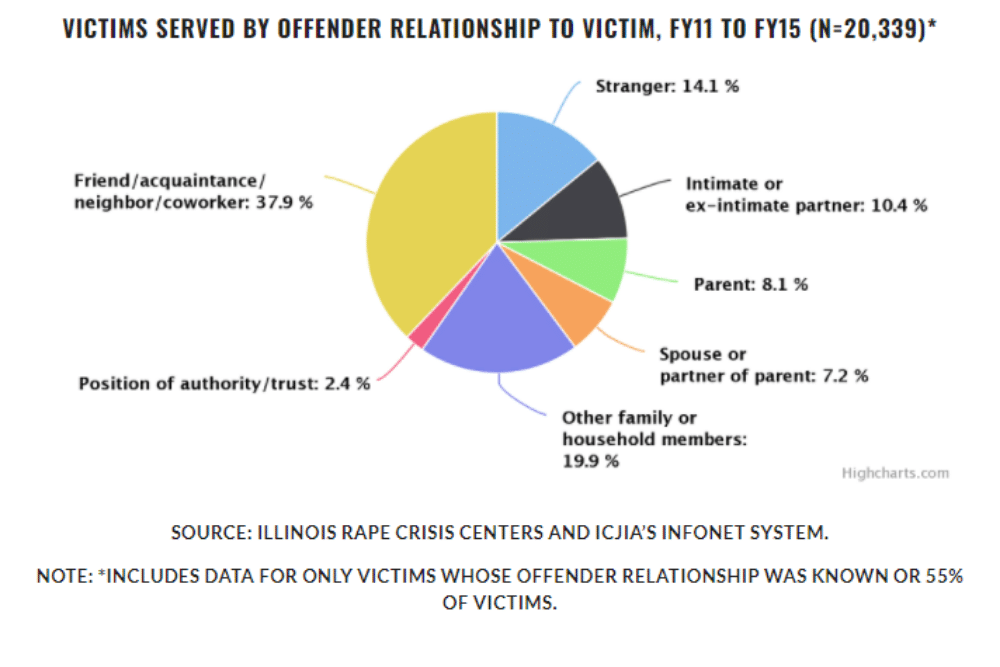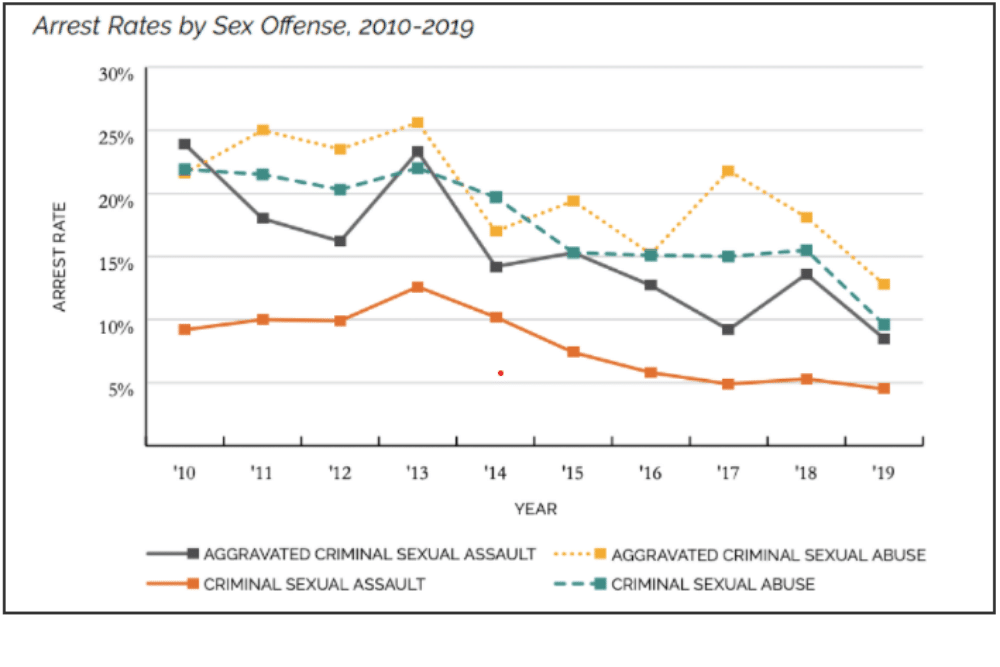What You Should Know about IL Sex Crimes
When many people hear the term “sex crime,” they often think of sexual assault. But, in Illinois, sex crimes are defined by many acts beyond sexual assault – some of which may surprise you.
When someone is accused of sex crimes, it’s serious. After all, being found guilty of a sex crime can have a profound impact on the rest of a person’s life, beyond any time they may have to spend in prison. This is precisely why it pays to understand the laws surrounding sex crimes in the state.
What types of crimes qualify as sex crimes in Illinois? What are the penalties? These questions and more are answered here in this comprehensive guide to Illinois sex crimes.
Sex Crimes in Illinois
There are several crimes that qualify as sex crimes in our state. They are:
Criminal Sexual Assault
In the state of Illinois, you don’t see the prosecution charge someone with rape. According to Illinois law, what some people would call “rape” is actually criminal sexual assault.
The reason the term rape has been taken out of court proceedings: The state legislature thought that calling it criminal sexual assault would reduce the stigma that often comes attached to the crime. They hoped this would encourage more people who have been victimized to come forward.
Sexual assault takes place when, in an act of sexual penetration, one or more of the following is perpetrated:
- Force or threat is used
- The victim was unable to give appropriate consent
- The victim is under the age of 18 and is a family member of the accused
- The victim is between 13 and 18 years old and the accused is over 17 – they are either in a position of authority over or related to the victim
According to the Illinois Rape Crisis Center, statistically, the most common perpetrator in criminal sexual assault cases is a friend, acquaintance, neighbor, or coworker of the victim.

Aggravated Criminal Sexual Assault
Aggravated criminal sexual assault occurs when sexual assault is accompanied by at least one of these factors:
- The use of a dangerous weapon in the commission of the crime
- Bodily harm is inflicted on the victim
- The victim’s life or the life of another was threatened
- Another felony was perpetrated at the same time
- The victim was over the age of 60
- The victim was considered physically handicapped
- The victim was drugged by the accused with a controlled substance
- A firearm was discharged by the defendant during the crime
- A firearm was discharged by the defendant during the crime and caused bodily harm to the victim or someone else
There are other circumstances where someone can be charged with aggravated sexual assault, as well. These factors are dependent on the age of the perpetrator when compared to the age of the victim and include:
- Sexual penetration of a victim aged eight or younger by someone age 16 or younger
- Sexual penetration of a victim ages nine to 12 where the threat of force or force was used
- Sexual penetration of a victim who, regardless of age, is severely mentally disabled
Predatory Criminal Sexual Assault

A person commits predatory criminal sexual assault when they commit a crime that involves these particular elements:
- A defendant aged 17 or older sexually penetrates a victim aged 12 or younger
- A defendant aged 17 or older sexually penetrates a victim aged 12 or younger, and a firearm was involved in some capacity in the crime
- A defendant aged 17 or older sexually penetrates a victim aged 12 or younger, and they delivered a controlled substance to the victim
Criminal Sexual Abuse
Criminal sexual abuse can be either a misdemeanor or a felony in Illinois. Misdemeanor sexual abuse occurs if a person commits sexual penetration or conduct in these varied scenarios:
- The victim was between the ages of 9 and 16, and the person accused was under the age of 17
- The victim was between the ages of 13 and 16, and the person accused is 17 or older, but not more than five years older than the victim
Felony criminal sexual abuse is perpetrated when there is sexual conduct along with the threat of force or force. This occurs with a victim who is unable to understand the act and give their consent.
Aggravated Criminal Sexual Abuse
Aggravated criminal sexual abuse in Illinois is perpetrated when criminal sexual abuse occurs along with one of these elements:
- The use of a dangerous weapon
- A victim who is 60 or older
- Bodily harm was done to the victim
- A threat was made against the victim’s life or the life of another
- Another felony was committed at the same time
- The victim was physically handicapped
- The victim was drugged by the defendant with a controlled substance
Aggravated criminal sexual abuse can also occur in circumstances where the victim is 17 or younger, and the perpetrator is a family member – as well as sexual conduct in any of these scenarios:

- The perpetrator is at least 17 with a victim who is 12 or younger
- The perpetrator is at least 17 and the victim is between 13 and 16
- The perpetrator is at least 17 and the victim is under the age of 8
- The perpetrator is at least 17 and the victim is between 9 and 16 and the threat of force was used
- The victim is someone who is mentally disabled with a defendant of any age
- The defendant is at least 17 and in a position of trust or authority over a victim between the ages of 13 and 17
- A defendant who is at least 17 years old and a minimum of five years older than a victim, who is between the ages of 13 and 17
How Are Sex Crimes Investigated?
When police investigate sex crimes in Illinois, they use several different methods depending on the circumstances. In some scenarios, they may have a victim make a report in order to establish that a sex crime took place.
This will result in an investigation where police gather evidence to make a judgment if a crime has indeed occurred. Evidence can include DNA samples or statements from potential witnesses.
If enough evidence is collected to charge someone with a crime, then an arrest is made, and the charges are officially brought against them in court.
Penalties for Sex Crimes Conviction in Illinois
Each sex crime conviction brings with it penalties specific to the crime. The following graph outlines the arrest rates based on each type of sex crime conviction between 2010 and 2019. The most frequent arrests fall consistently into the aggravated criminal sexual abuse category.

SOURCE: CHICAGO ALLIANCE AGAINST SEXUAL EXPLOITATION
Criminal Sexual Assault
This crime is a Class 1 felony. If convicted, you can spend up to 15 years incarcerated for it. It is a crime that does not allow probation, either, so, under the law, a judge cannot sentence anyone convicted of it to probation in lieu of time in prison. There is also a minimum penalty associated with this conviction: Four years in prison.
If the person convicted has a criminal history of sexual assault convictions, then it turns into a Class X felony, the most serious level of felony in Illinois. That can raise the length of the prison sentence up to 30 years or even the length of the offender’s natural life, depending on the circumstances of the conviction.
Aggravated Criminal Sexual Assault
This type of sexual assault is considered a Class X felony. The penalty associated with that is up to 30 years incarceration, with extensions of up to a quarter of a century for aggravating factors. This is also a felony where the judge cannot give probation. Prison time is mandatory.
For anyone who is convicted two or more times for this crime, it can lead to a sentence of the rest of their natural life in prison without the possibility of parole.
Predatory Criminal Sexual Assault
Another Class X felony, this type of assault can send someone to prison for up to 30 years. In the instances where a firearm is used during the offense, that can add on up to 50 years – or the rest of a defendant’s natural life in prison. A second conviction of this offense will send someone to prison for life.
Criminal Sexual Abuse

This can be either a Class A misdemeanor or a Class 4 felony, as was noted above. If it’s a misdemeanor charge, those convicted can end up in jail. The court may require a person to register as a sex offender.
Class 4 felonies can be eligible for probation, but that is entirely up to the judge in the case. Anyone convicted of a Class 4 felony can spend up to three years in prison.
For anyone with two or more convictions of this crime on their record, a Class 2 felony can be charged. That can send a person to prison for up to seven years, but it is also probational.
Aggravated Criminal Sexual Abuse
This crime can also be a Class A misdemeanor or a Class 2 felony. If convicted of a felony, a person can spend up to seven years behind bars.
Registration as a Sex Offender
Anyone convicted of these sex crimes will have to register in the state of Illinois as a sex offender. How long a person must register depends on the crime of which they are convicted.
Anyone who is deemed a sexual predator will have to register for life, but, in other cases, the severity of the crime committed will help to determine how long a person must register. Sex offenders in Illinois must register for at least 10 years.
When someone registers as a sex offender, they must provide information to local law enforcement as soon as three days after they’ve been sentenced. They must renew their registration at least once per year. If any of their information changes, such as their address, they must update it.
They must also provide personal details such as name, date of birth, social media account names, and physical characteristics. These details are uploaded into a system that is available to the public. It will also show up on background checks.
Those who are on the sex offender registry also must abide by certain rules. If they travel out of town, they must inform the local law enforcement of where they are going. If they move to another state, they will have to register under the laws of the new state, and they must follow those rules. If they fail to do this, then they can be charged with an additional Class 3 felony that can send them to jail or require them to pay fines – or both.

They also are restricted from being in certain places as registered sex offenders. For example, they are not allowed to go within 500 feet of a school. They also cannot be within 500 feet of a park, daycare facility, or another public place where children under the age of 17 may be present. They cannot live within 500 feet of any of these places, either.
Can Your Name Be Removed from the Sexual Offender Registry?
A person’s name can only be removed from the sexual offender registry when their required period of registration comes to an end. When it does, you can petition the court to have your name removed. However, it’s not possible to have your records sealed or expunged when you have a sex crime conviction.
Defenses to Sex Crimes
No matter what you are accused of, you have the right to defend yourself in court with the presumption of innocence on your side. Every case is different, but, in general, there are some solid ways to defend against sex crime charges. Your experienced attorney will be able to help guide you once they know the facts of your case.
Some common defense strategies include:
Innocence
This is one of the most basic defenses out there, but if you are not guilty of the crime you are being accused of, you need to make a case for that. If you were, for example, at a different location when the crime took place or with someone else who can corroborate your story, then that is evidence that should be presented to the court to prove your innocence.
Consent
If there are sex acts that took place when the accused believed they had consent from the victim, then that should be brought up in court, as well. If there is some type of evidence that can be produced to show this, then make sure to let your attorney know.

Sex crimes are serious crimes to be accused of and can impact the rest of your life. If you’re facing sex crimes charges, then meet with an attorney as soon as you can.
About the Author:
Andrew M. Weisberg is a former felony prosecutor who now serves as a defense attorney in the greater Chicago area. He has extensive experience in handling all types of criminal cases, from sex offenses and domestic violence to retail theft-related crimes, murder, and drug crimes. His work has been recognized by Avvo, Expertise, National Trial Lawyers, and others, and he has been featured on countless news outlets for his experience and knowledge in criminal law.







 Blog Home
Blog Home 










